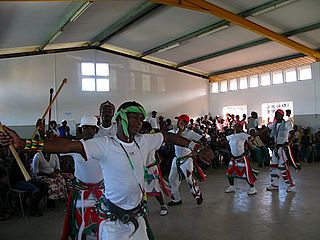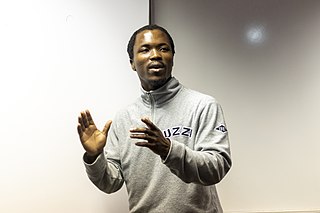Cato Manor is a settlement located 7 kilometres (4.3 mi) from the city centre of Durban, South Africa.

Abahlali baseMjondolo is a socialist shack dwellers' movement in South Africa which primarily campaigns for land, housing and dignity, to democratise society from below and against xenophobia.

Sibusiso Innocent Zikode is the president of the South African shack dwellers' movement, which he co-founded with others in 2005. Abahlali baseMjondolo claims to have an audited paid up membership of over 115 000 across South Africa. His politics have been described as 'anti-capitalist'. According to the Mail & Guardian "Under his stewardship, ABM has made steady gains for housing rights."

Kennedy Road is an informal settlement in Durban (eThekwini), in the province of KwaZulu-Natal in South Africa. Formed in the late 1970s or early 1980s, the settlement was mentioned by the African National Congress (ANC) after the end of apartheid but amenities were not improved. The site is mostly not connected to sanitation or electricity. Dissatisfaction with local councillors led to 2005 protests including a road blockade, out of which the shack dwellers movemment Abahlali baseMjondolo (AbM) formed. In 2009, an AbM meeting was attacked resulting in two deaths and a court case. More recently, the municipality has improved facilities and promised to relocate inhabitants.

The Landless People's Movement is an independent social movement in South Africa. It consisted of rural people and people living in shack settlements in cities. The Landless People's Movement boycotted parliamentary elections and had a history of conflict with the African National Congress. The Landless People's Movement was affiliated to Via Campesina internationally and its Johannesburg branches to the Poor People's Alliance in South Africa.

The Poor People's Alliance was network of radical grassroots movements in South Africa. It was formed in 2008 after the Action Alliance, formed in December 2006, was expanded to include two more organisations. It become defunct following the collapse of two of its affiliated movements, the Western Cape Anti-Eviction Campaign and the Landless People's Movement.
No Land! No House! No Vote! is a campaign by a number of poor people's movements in South Africa that calls for the boycotting of the vote and a general rejection of party politics and vote banking. The name is meant to imply that if government does not deliver on issues important to affected communities these movements will not vote.
South Africa has been dubbed "the protest capital of the world", with one of the highest rates of public protests in the world.
Rubin Phillip is bishop of the Anglican Diocese of Natal. The great-grandchild of indentured labourers from Andhra Pradesh, Phillip is the first person of Indian heritage in South Africa to hold the position of Bishop of Natal. He grew up in Clairwood, a suburb of Durban with a large concentration of people of Indian descent, in a non-religious household, but converted to Christianity. He was a noted anti-apartheid activist and spent three years under house arrest in the 1970s and was banned in 1973. He was enthroned as bishop in February 2000.
The KwaZulu-Natal Elimination and Prevention of Re-emergence of Slums Act, 2007 was a provincial law dealing with land tenure and evictions in the province of KwaZulu-Natal in South Africa.

Zodwa Nsibande was the General Secretary of the Abahlali baseMjondolo youth league in 2009. She was critical of the impact of the FIFA 2010 World Cup on shack dwellers in Durban.
QQ Section also known as Tambo Park, was founded in 1989 and is an Informal Settlement in the Site B sub-division of Khayelitsha in South Africa.
The attack on Kennedy Road in Durban, South Africa, occurred on 26 September 2009. A mob of men armed with bush knives, guns and bottles entered the Kennedy Road informal settlement searching for leaders of the shackdwellers movement Abahlali baseMjondolo (AbM). They looted shacks and threatened residents, before attacking a hall where a youth meeting was happening. Two people were killed and around a thousand were displaced. In the aftermath, AbM representatives such as S'bu Zikode went into hiding and thirteen AbM members were arrested.
The Constitution of South Africa protects all basic political freedoms. However, there have been many incidents of political repression, dating back to at least 2002, as well as threats of future repression in violation of this constitution leading some analysts, civil society organisations and popular movements to conclude that there is a new climate of political repression or a decline in political tolerance.
There have been many political assassinations in post-apartheid South Africa. In 2013 it was reported that there had been more than 450 political assassinations in the province of KwaZulu-Natal since the end of apartheid in 1994. In July 2013 the Daily Maverick reported that there had been "59 political murders in the last five years". In August 2016 it was reported that there had been at least twenty political assassinations in the run up to the local government elections on the 3rd of August that year, most of them in KwaZulu-Natal.
In March 2013 around a thousand people occupied a piece of land in Cato Crest, Durban and named it Marikana after the Marikana miners' strike. Mayor James Nxumalo blamed the occupation on migrants from the Eastern Cape. He was strongly criticised for this by the shack dwellers' movement Abahlali baseMjondolo who said that "The City Hall is red with blood".
Nkululeko Gwala originally from Inchanga in KwaZulu Natal, was a resident of Cato Crest, which is part of Cato Manor in Durban, and a supporter of the Marikana Land Occupation (Durban). He was also a prominent member of the shackdwellers' social movement Abahlali baseMjondolo and chairperson of their Cato Crest Branch. He was assassinated on 26 June 2013.

Ayanda Ngila (1992–2022), was a land activist, a prominent leader in the shack dweller's movement Abahlali baseMjondolo and deputy chairperson of its eKhenana Commune. He was assassinated on 8 March 2022.

The eKhenana Commune is a prominent land occupation in the historic working-class area of Cato Manor in Durban, South Africa. According to the Socio-Economic Rights Institute "The eKhenana settlement is organised as a cooperative in which residents collectively run a communal kitchen and tuck shop, theatre, poetry and music projects, and care for a vegetable garden named after the late Nkululeko Gwala [assassinated in 2013] as well as a poultry farm named in honour of the late S’fiso Ngcobo [assassinated in 2018]. The Commune has solar power and is also home to a political school that residents named the Frantz Fanon School, as well as the Thuli Ndlovu Community Hall [Ndlovu was assassinated in 2014]. The Commune has suffered sustained political repression, including multiple arrests and three assassinations in 2022.

Lindokuhle Mnguni was a land activist and a prominent leader in the shack dwellers' movement Abahlali baseMjondolo. He was chairperson of the movement's youth league as well as the chairperson of the eKhenana Commune. He was a leader of eKhenana's food sovereignty project which sought to make the commune more self-sustaining and independent. He was assassinated on 8 August 2022.









